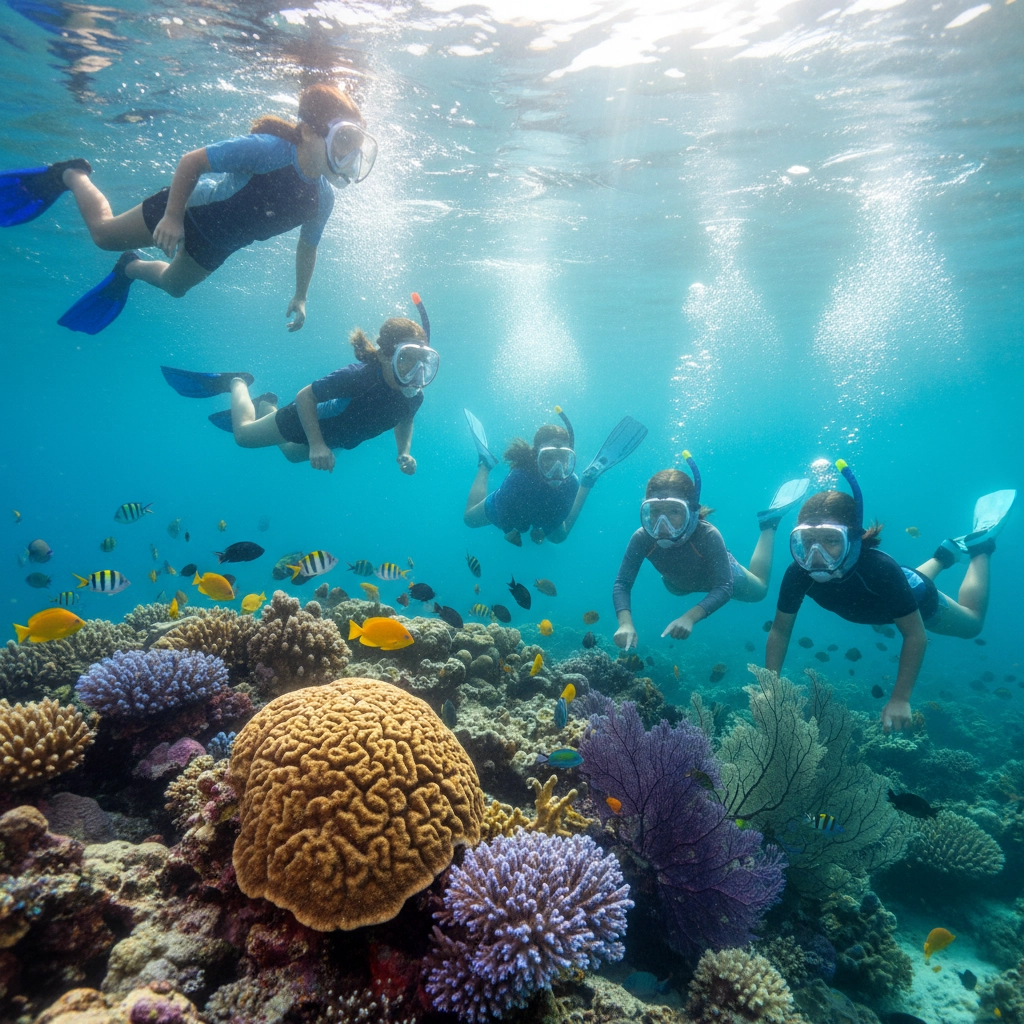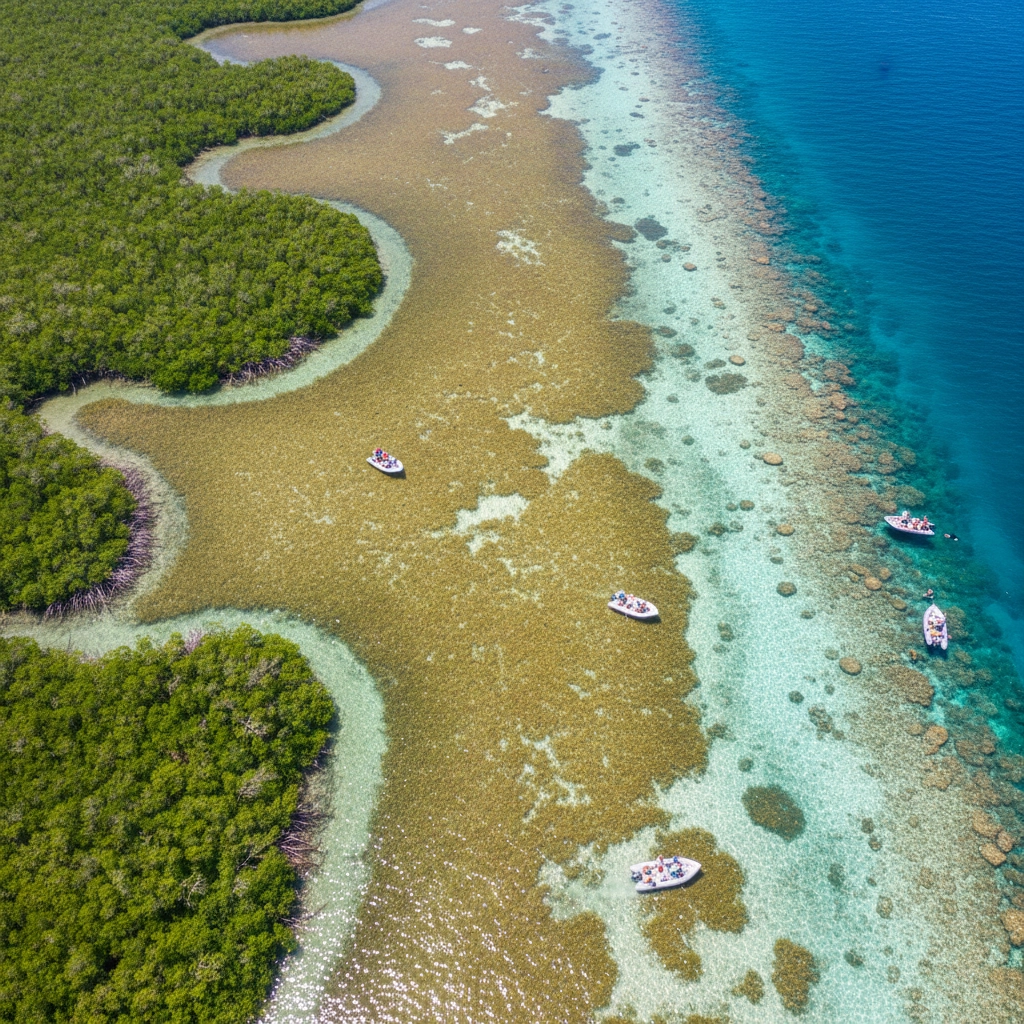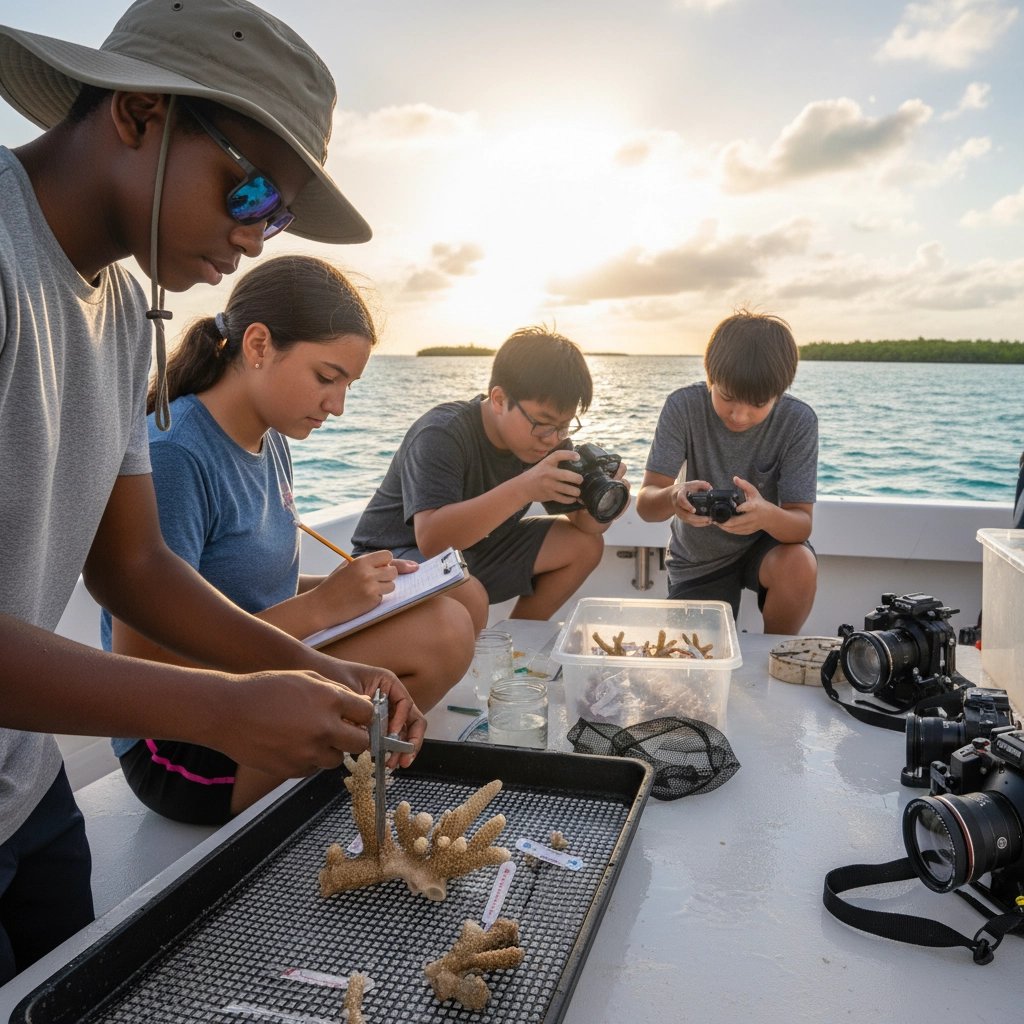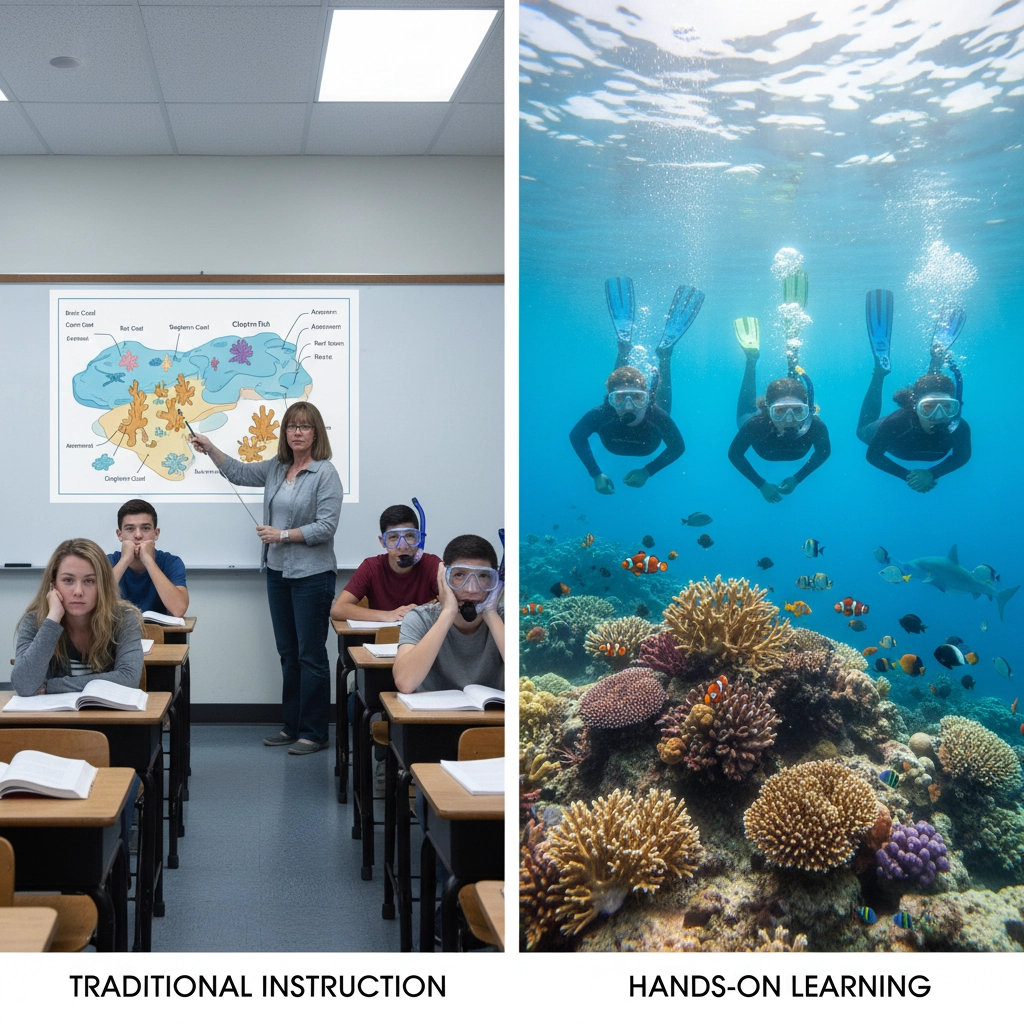Florida Keys vs. Traditional Classroom: Why Your Middle School Science Trip Needs a Living Laboratory
- Caleb Mullenix
- Nov 2, 2025
- 5 min read
Ensuring your middle school students receive the most impactful science education possible requires careful consideration of learning environments that extend far beyond traditional classroom walls. The Florida Keys present an unparalleled opportunity to transform abstract scientific concepts into tangible, memorable experiences that will shape your students' understanding of marine science for years to come.
The Critical Difference: Passive Learning vs. Active Discovery
Traditional classroom instruction, while foundational, limits students to passive observation of marine ecosystems through textbooks, videos, and static displays. In contrast, the Florida Keys function as a living laboratory where students become active scientists, engaging directly with the world's third-largest barrier reef system and interconnected coastal ecosystems.
Consider the profound difference between showing students a photograph of coral polyps versus having them observe living coral formations while snorkeling in crystal-clear waters. The living laboratory approach creates lasting neural pathways that static classroom materials simply cannot replicate.

Comprehensive Ecosystem Access in One Location
The Florida Keys offer unprecedented access to three distinct marine environments within a single expedition location. Students can study coral reefs, seagrass beds, and mangrove forests consecutively, observing the critical interconnections between these habitats that support the entire marine food web.
Begin by researching how these ecosystems function independently, then prepare your students to witness their interdependence firsthand. Mangroves serve as nurseries for juvenile fish that later populate coral reefs. Seagrass beds filter nutrients and provide feeding grounds for sea turtles and manatees. Understanding these relationships through direct observation creates comprehensive ecological knowledge that classroom diagrams cannot convey.
Hands-On Research Opportunities That Matter
Emphasize the importance of authentic scientific engagement when planning your Florida Keys expedition. Students participate in real research projects including:
Coral restoration monitoring and data collection
Water quality testing across multiple habitats
Marine debris impact assessments
Sea turtle rehabilitation observation
Citizen science contributions to ongoing conservation efforts
Create an itinerary that incorporates these research opportunities with guidance from marine biology professionals. Students learn proper sampling techniques, data recording methods, and scientific observation protocols that align directly with Next Generation Science Standards.

Measurable Learning Outcomes vs. Traditional Assessment
Advise administrators that Florida Keys expeditions produce measurable improvements in scientific knowledge, research skills, environmental awareness, and critical thinking abilities. Unlike traditional classroom assessments that measure memorization, living laboratory experiences develop practical competencies including:
Scientific methodology application in real-world settings
Data analysis using authentic field-collected information
Environmental problem-solving through direct habitat observation
Conservation ethics development through hands-on stewardship activities
Document these outcomes through pre- and post-expedition assessments to demonstrate the educational value of experiential learning to school leadership and parents.
Professional Development for Educators
Ensure that participating teachers receive comprehensive preparation for maximizing learning opportunities in the field. The Florida Keys living laboratory approach requires different instructional strategies than classroom-based teaching.
Encourage educators to:
Develop observation skills for real-time species identification
Learn basic snorkeling safety and underwater communication
Practice field data collection techniques before departure
Understand tidal patterns and weather considerations affecting daily activities
Master group management in aquatic environments

Safety Protocols in Marine Environments
Maintaining student safety remains paramount when transitioning from controlled classroom settings to dynamic marine environments. Discuss emergency procedures thoroughly, including:
Water safety protocols and buddy system implementation
Sun protection and hydration requirements in tropical climates
Marine life interaction guidelines to prevent injury
Equipment safety for snorkeling and research activities
Emergency communication procedures in remote locations
Share a detailed safety briefing with students, parents, and chaperones well before departure to ensure everyone understands the increased responsibility required in natural settings.
Cost-Effectiveness Considerations
Address budget concerns by emphasizing the concentrated learning value of multi-day immersive experiences. While initial costs exceed traditional classroom instruction, the depth of learning achieved in three days often surpasses months of conventional marine science curriculum.
Consider these factors when evaluating program costs:
All-inclusive packages typically range from $540 per student for three-day programs
Teacher accommodations often included at no additional charge
Equipment, transportation, and meal costs consolidated into single fee
Long-term impact on student career interest and environmental stewardship
Alignment with multiple curriculum standards in condensed timeframe
Preparing Students for Transformative Experiences
Begin preparation months before departure to maximize learning outcomes. Students should arrive in the Florida Keys with foundational knowledge that enhances their ability to appreciate complex ecological relationships.
Implement this preparation sequence:
Establish baseline knowledge of marine ecosystem components
Introduce key species students will encounter during the expedition
Practice basic research skills including observation recording and data collection
Discuss conservation challenges facing coral reef systems
Set learning objectives for each habitat students will explore
Integration with Classroom Curriculum
Ensure seamless integration between living laboratory experiences and ongoing classroom instruction. The Florida Keys expedition should enhance, not replace, fundamental science education.
Plan curriculum connections including:
Pre-expedition units on marine biology fundamentals
Daily reflection activities during field experiences
Post-expedition analysis of collected data and observations
Research projects extending expedition learning throughout the academic year
Presentation opportunities for students to share discoveries with younger classes

Long-Term Impact on Student Development
Emphasize to parents and administrators that living laboratory experiences create lasting impacts extending far beyond immediate academic benefits. Students who participate in authentic scientific research develop:
Increased interest in STEM career pathways
Enhanced environmental stewardship values
Improved confidence in outdoor learning environments
Stronger collaborative and problem-solving skills
Memorable experiences that inspire continued learning
These outcomes contribute to well-rounded student development that standardized classroom instruction alone cannot provide.
Addressing Common Concerns
Anticipate and address common concerns from parents and administrators regarding expedition-based learning:
Academic Time Concerns: Document how expedition learning addresses multiple curriculum standards simultaneously, often more efficiently than traditional classroom instruction.
Safety Worries: Provide comprehensive safety protocols and emphasize the professional supervision provided by experienced marine educators.
Cost Objections: Present cost-per-learning-outcome analysis comparing expedition experiences to equivalent classroom instruction hours.
Accessibility Issues: Work with program providers to accommodate students with varying physical abilities and financial circumstances.
Professional Expedition Planning Support
Consider partnering with experienced educational travel organizations to ensure optimal learning outcomes while maintaining safety standards. Appleseed Expeditions specializes in creating transformative marine science experiences that align with educational objectives while providing comprehensive logistical support.
Professional expedition providers offer:
Curriculum-aligned programming designed by marine science educators
Safety protocols developed through years of student group experience
Equipment provision and maintenance reducing school liability
Emergency response procedures and trained staff supervision
Post-expedition resources for continued classroom integration
Making the Decision
Encourage administrators to view Florida Keys expeditions as essential investments in student scientific literacy rather than optional enrichment activities. In an era where environmental challenges require scientifically literate citizens, providing students with authentic ecosystem experiences becomes increasingly critical.
The living laboratory approach transforms abstract concepts into concrete understanding, creates lasting memories that sustain lifelong learning interest, and develops practical skills that serve students throughout their academic and professional careers. When weighing traditional classroom instruction against transformative field experiences, consider not just immediate costs but long-term educational impact on student development and environmental awareness.
Your students deserve science education that extends beyond textbook limitations into the remarkable living systems that define our planet's future.



Comments